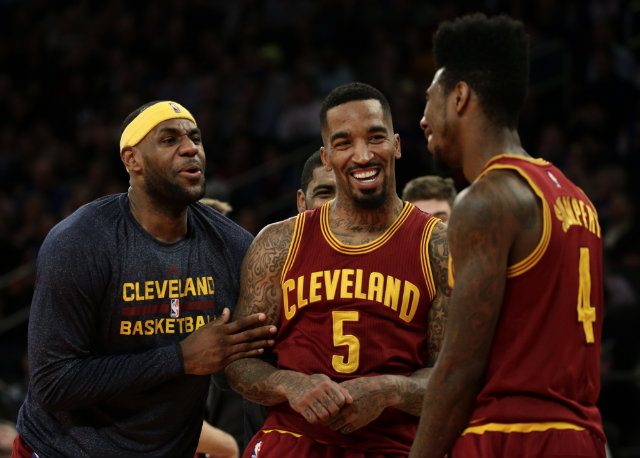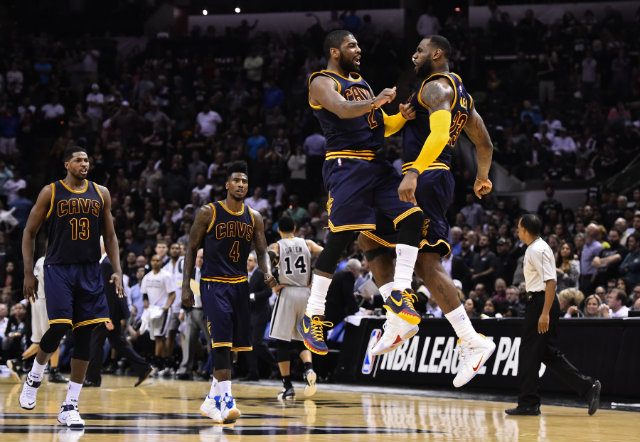SUMMARY
This is AI generated summarization, which may have errors. For context, always refer to the full article.

MANILA, Philippines – For the first time in 8 years, a LeBron James team is entering the NBA Finals as underdogs. Given that the Cleveland Cavaliers have the best basketball player in the world, saying that attests to how dominant the Golden State Warriors have played all season and throughout the playoffs (79-18) – most especially against a more powerful Western Conference.
Is it safe to brush off the Cavaliers and chalk LeBron’s record in the finals down to 2-4 then? Not so fast. The Cavaliers may be the David to Golden State’s Goliath, but that doesn’t mean they don’t stand a chance – despite the number of injuries that have hit the team.
In order for LeBron to complete his promise of bringing home a Larry O’Brien trophy to the championship-starved city of Cleveland, he and his Cavaliers have a high hill to climb that involves a ton of road blocks. One misstep, and they could find themselves crashing into the abyss of Golden State’s imposing play on both sides of the floor.
The Cavaliers simply cannot take a minute or two off. If they do, that 120-second frame could be all Steph Curry or Klay Thompson need to hit a few 3-pointers, get hot, and break a game wide open – most especially if it takes place at the Oracle Arena and via transition plays.
Each possession matters. If Cleveland plays every second from the opening tip until the final buzzer with full dedication (chiefly on defense), get a few bounces to go their way, and get hit with a little bit of luck, there’s a chance they escape with one of the biggest upsets in NBA Finals history.
Of course, there are a lot of Xs and Os involved – certain matchups, switches, and gambles that need to pay off. When facing an offense like Golden State’s, you can’t expect to totally stop it, but containing it to some degree is possible.
And against the Warriors’ league-leading defense, the Cavaliers will need guys like JR Smith and Iman Shumpert to hit shots; Tristan Thompson and Timofey Mozgov to alter the tempo of the series by winning the rebounding battle; Kyrie Irving to be the co-pilot despite his hobbled knee; and LeBron to be even greater than he’s already been.
How Cleveland can win the title
Here’s a rundown of the things Cleveland needs to do in order to survive and take down the Warriors:
It’s easier said than done, and likely a technique the Pelicans, Grizzlies, and Rockets already tried to utilize, but the Cavs need to make someone else besides Steph Curry beat them.
(INFOGRAPHIC: The Lowdown: 2015 NBA Finals)
Most of Cleveland’s defensive schemes this postseason have involved playing Mozgov and Thompson together with either big dropping back in pick-and-roll situations. It worked when they defended an up-and-down shooter in Derrick Rose and in the Eastern Conference Finals against Jeff Teague, who had a tougher time spotting open shooters in drive-and-kick situations once Kyle Korver was lost to an ankle injury after Game 2.
The same dynamic won’t suffice with Curry, who’s the league MVP, best shooter in the NBA today, and someone Steve Nash called the greatest shooter ever. And even in instances where Curry decides to drive, maybe Thompson could make him work, but Mozgov doesn’t stand a chance. Add that with Curry’s screener cutting to the paint against a smaller defender, and trouble will brew for Cleveland.
You’ll likely see the Cavs change schemes by having both Curry’s initial defender and the screener’s man trap him a lot together – especially near the sidelines. When Cleveland goes small with Thompson at the 5 and LeBron at the 4, this will be their play 99% of the time. Doing so leaves the rest of Cleveland’s defense on a 4-on-3 disadvantage against the Warriors’ offense, but forcing someone like Draymond Green or Harrison Barnes to beat you off the dribble may be a better idea than giving Curry space to operate.
Crash the offensive board
Playing small, however, comes with a cost: Cleveland’s biggest strength outside of LeBron this postseason is their offensive rebounding. With both Mozgov and Thompson on the floor this playoffs, Cleveland has grabbed an insane 32% of their misses that have led to an average of 15.8 second chance points per contest.
Controlling offensive rebounding, like they did against Chicago and Atlanta, will be key for the Cavs to control tempo and force the Warriors into playing a more Cavalier-style of game. If that happens, then the series could swing LeBron and company’s way.
But going big, as mentioned above, leaves Mozgov in an undesired position of having to deal with Curry who will call for picks from Andrew Bogut. Another defensive issue Cleveland faces is where to put Kyrie Irving. Even when healthy, the All-Star point guard is average at best on defense, and there is no way he will be able to navigate through the array of screens and pin-downs Curry – or Thompson – will use to get open.

Cleveland coach David Blatt will likely put Irving on Barnes or Green, but both men can torch Kyrie in the post. Nonetheless, forcing Golden State to beat the Cavaliers with Barnes jumpers or Green hook shots in the block may be the least of all evils, and Cleveland’s best prayer at containing Golden State’s offense.
Speaking of Irving, he will have to provide more than what he gave in the series against Atlanta (13 points, 5.5 assists a game) where he was far from himself and missed two games. LeBron’s genius, timely shooting by Smith and Shumpert, a bad string of injuries for the Hawks and an Al Horford ejection enabled Cleveland to escape with a sweep. It will be far from the same against the Dubs.
If Irving can revert to even his regular season form (21.7 PPG, 5.2 APG), it will be a major aid. Golden State is going to man LeBron one-on-one and try to not let him beat them by dishing to open shooters off double-teams. There will be that one game LeBron wins by himself – think vs. Detroit in Game 5 in 2007 or vs. Boston in Game 6 in 2012 – but for the Cavs to have a shot at winning 4 of 7, Irving will need to deliver on a consistent basis.
And right there is another thing Cleveland has going for them – something they do every game: LeBron James. Jimmy Butler tried. So did DeMarre Carroll. Sure, you can limit the 4-time MVP to shoot below 50% and hit his effectivity a bit, but he will get his numbers anyway. Green, Barnes, Thompson, and Bogut will each get turns trying to stop him from getting to the rim, but LeBron will find a way to get there – whether through penetration or in the post.
Golden State will surely drop down while guarding James or go under his pick-and-rolls and bait him to taking jumpers – think what Kawhi Leonard and the Spurs did in the 2013 and 2014 NBA Finals. James is shooting just 33% on long 2s this playoffs plus a disastrous 17% from downtown. The history of his jump shot proves it can get unpredictable at times. But when he has that going, limiting him will be close to impossible. The Warriors have to hope he continues to miss.
If James punishes the Warriors’ defense enough that they finally decide to send multiple defenders his way, that’s when the floodgates open and passes will be sent to Smith, Shumpert, and other snipers. The pressure will be on them to make open shots. If they do, then Cleveland will be in business. If not, prepare the championship parade in The Bay.
The most interesting X-factor that could decide this series is transition. Golden State is the best fastbreak team in the playoffs (21.3 points a game), but they’re now going up against a defense that has limited opponents to under a point per fastbreak possession in the postseason. One has to give.
That’s where the risk of crashing for offensive boards come. In instances where both Thompson and Mozgov go for rebounds, that leaves 3 Cavalier defenders to defend what’s usually 4-on-3 Golden State transition chances, assuming they get the defensive rebound. Such scenarios – especially with the Warriors’ ability to spread the floor – will be danger for LeBron and friends.
Golden State, however, coughs up the ball a lot as well (15.3 a game). Cleveland hasn’t been a rampaging team on the break this playoffs (7.4 a game), but any team with LeBron James is always going to be deadly in transition. And since they’re going up against a great defensive team that has the ability to switch almost every pick-and-roll in halfcourt plays, the Cavs will need every easy fastbreak point they can get.
Research and statistics used in this article C/O Grantland, Real GM, and NBA Stats.
– Rappler.com
Add a comment
How does this make you feel?
There are no comments yet. Add your comment to start the conversation.